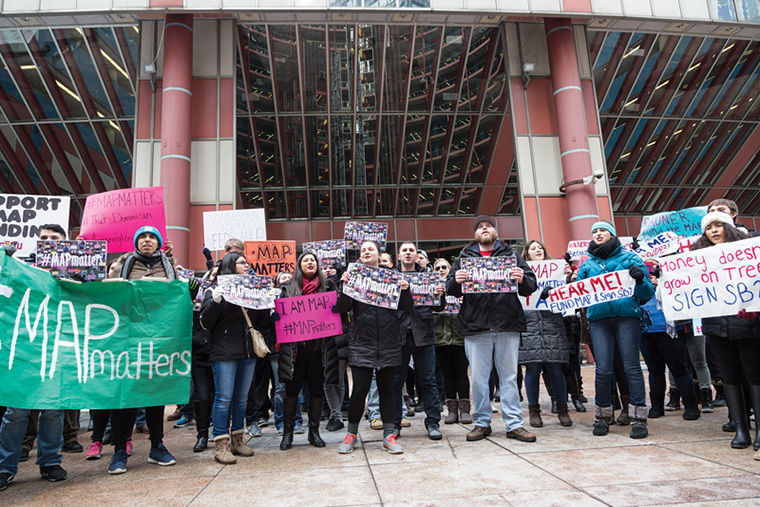Lost without a MAP: College unable to fund monetary awards for 2016– 2017
Students from Chicago-area institutions, including Columbia, have lobbied for MAP grant funding from the budget-stymied state. The most recent rally (above) was on Feb. 16.
April 4, 2016
Columbia will not fund student Monetary Award Program grants for the 2016–2017 academic year, according to President and CEO Kwang-Wu Kim.
The decision announced on April 4, two days after more than 3,000 prospective students attended Open House, reflected the college’s inability to cover another year’s worth of payments if the state’s budget stalemate continues, Kim said.
“It comes down to [the fact that] we just can’t afford it,” Kim said.
Emails were sent April 1 to Columbia’s more than 1,800 2015–2016 MAP grant recipients—whose total financial aid exceeds approximately $7 million—mentioning the school’s funding of their grant money. Letters to 2016–2017 MAP grant recipients were sent out on April 4.
Kim said the college was hoping to see the state’s budget crisis be resolved by Gov. Bruce Rauner and other major Illinois leaders, but added that he is not expecting a resolution anytime soon.
Dick Simpson, a professor of political science at University of Illinois at Chicago, said the likelihood of Rauner and other officials resolving the crisis is uncertain, although a new budget could be passed in April—when the legislative session begins again—or after the November elections.
Columbia’s inability to help fund MAP grants for 2016–2017 could lead to higher student debt and enrollment declines, according to Drew Anderson, a post-doctoral researcher at the University Wisconsin-Madison’s HOPE Lab who studies higher education economics.
Denying funding to MAP-eligible, lower-income Illinois residents could exclude them from coming to or remaining at the college, he said.
“[Students] could choose not to enroll; they could choose to take on more student debt; they can choose to enroll but somewhere else—pick a different place than they were considering going to that maybe has lower crises—or decide to work and earn more to make ends meet that way,” Anderson said. “It’s not clear if it’ll directly affect enrollment, but it could.”
Noah Spiegel-Blum, a freshman theatre major who relies on aid to attend Columbia, recently met with Student Financial Services to discuss a financial plan. He said the adviser he met with suggested he take steps to become an Illinois resident to qualify for a MAP grant, which now seems like bad advice.
“The whole conversation was very energetic, like, ‘Get a [state] ID so we can get you a MAP grant,’” Spiegel-Blum said.
While Columbia typically attracts more out-of-state residents than neighboring schools and may be less affected by not funding grant money for a second year, Kim said he is still expecting an enrollment decline.
“Obviously, there is going to be some impact—that’s just common sense,” he said.
Kim said halting the multi-million-dollar student center to fund the grants was not something the college wanted to do.
“That’s the balance we’re trying to find between protecting students and keeping the college moving to the things we’re all excited about.” Kim said.
Across Illinois, Governor State University implemented a tuition freeze along with promising to fund MAP grants for 2016-2017. DePaul University also promised to honor MAP grants for freshman and transfer students next semester.
For students affected by the college’s decision, resources will be available for those who will need to make a financial plan, according to Cynthia Grunden, assistant vice president of SFS.
The college is also planning ahead in case a budget is not finalized by next spring. If a budget is not resolved, students can then pay off the money typically covered by the grant over a longer period of time.
“We want them to have ample notice to plan for [no budget resolution],” Grunden said.
Amanda Hamrick, a junior interactive arts & media major and the vice president of the Student Government Association, said while the college will not provide money for 2016–2017, she is happy the grants have been covered this year and will continue advocating for a budget resolution.
“We need to be angry and protest [to] try and get MAP back,” she said.
For more information regarding the college’s funding of MAP grants, read SFS’s FAQs:www.colum.edu/mapfaq








